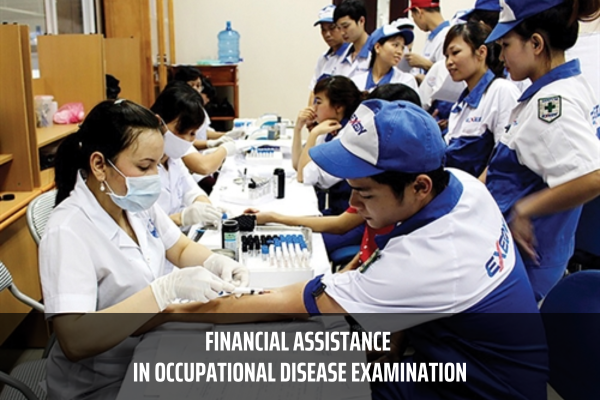Vietnam: How many times can an employee be supported by the employer in receiving occupational disease examination within one year according to Decree 88/2020/ND-CP?
- Vietnam: How many times can an employee be supported by the employer in receiving occupational disease examination within one year according to Decree 88/2020/ND-CP?
- Resolution 19: How many percent of employees shall be examined for occupational diseases according to National Program on Occupational Safety and Hygiene in Vietnam?
- What are the regulations for health check-ups and treatment for occupational diseases applicable to employees in Vietnam?
Vietnam: How many times can an employee be supported by the employer in receiving occupational disease examination within one year according to Decree 88/2020/ND-CP?
Pursuant to Article 17 of Decree 88/2020/ND-CP, each employee is supported by the employer with occupational disease examination a maximum number of times as follows:
Level of financial assistance in occupational disease examination
1. The assistance is 50% of the costs of examination of the occupational disease determined on the basis of list of prices of occupational disease examination promulgated by Minister of Health at the time on which the employee had the occupational disease examination after health insurance payout has been provided, but the assistance must not exceed VND 800,000 per person per examination.
2. The assistance is provided to each employee twice at the maximum and only once a year.
Thus, according to Decree 88/2020/ND-CP on elaborating some Articles the Law on Occupational Safety and Hygiene 2015 on compulsory insurance for occupational accidents and occupational diseases, the financial assistance in occupational disease examination is provided to each employee twice at the maximum and only once a year.

Vietnam: How many times can an employee be supported by the employer in receiving occupational disease examination within one year according to Decree 88/2020/ND-CP? (Image from the Internet)
Resolution 19: How many percent of employees shall be examined for occupational diseases according to National Program on Occupational Safety and Hygiene in Vietnam?
Pursuant to subsection 2, Section I of Resolution 19/NQ-CP in 2022, the specific objectives by 2025 are as follows:
I. OBJECTIVES
1. General objectives
Improve working conditions; prevent occupational accidents and diseases, tend to workers’ health; safeguard workers’ life, Government’s properties and organizations’ assets towards sustainable development of the country.
2. Specific objectives by 2025
a) Objective 1: Reduce the frequency of fatal occupational accidents by 4% averagely on annual basis.
b) Objective 2: Increase the number of workers to be examined for occupational diseases by 5% averagely on annual basis; increase the number of enterprises undergoing workplace environmental monitoring by 5% averagely on annual basis.
c) Objective 3: Provide training in occupational safety and health to over 90% of managerial individuals in charge of occupational safety and health tasks working in district-level authorities and in management boards of economic zones, industrial parks, export processing zones and hi-tech parks.
d) Objective 4: Provide training in occupational safety and health to over 80% of workers performing tasks or jobs bound by strict requirements for occupational safety and health, and to 80% of individuals in charge occupational safety and health tasks.
dd) Objective 5: Provide training in occupational safety and health to over 80% of individuals in charge of grassroots healthcare tasks.
e) Objective 6: Provide proper information on occupational safety and health to over 80% of craft villages and cooperatives at high risk of occupational accidents and diseases.
g) Objective 7: Pay compensations and benefits to over 80% of victims of occupational accidents or diseases in accordance with regulations of law.
h) Objective 8: Report, investigate and settle 100% of fatal occupational accidents in accordance with regulations of law.
Thus, according to National program for occupational safety and health in 2021 - 2025 period enclosed with the Government’s Resolution 19/NQ-CP in 2022 dated February 16, 2022, by 2025, the number of workers to be examined for occupational diseases shall increase by 5% averagely on annual basis.
What are the regulations for health check-ups and treatment for occupational diseases applicable to employees in Vietnam?
Pursuant to Article 21 of the Law on Occupational Safety and Hygiene 2015, health check-ups and treatment for occupational diseases applicable to employees are as follows:
- Annually, an employer shall organize health check-ups at least once a year for employees; and health check-ups at least twice a year for employees doing heavy and harmful jobs and disabled, underage and elderly employees.
- Beside regulations prescribed in Clause 1 of Article 21 of the Law on Occupational Safety and Hygiene 2015, the employer shall organize obstetric checks for female employees, and occupational disease checks for employees who work in conditions with hazards of occupational diseases.
- Before an employee is assigned works or taken another work that is more heavy, harmful or dangerous, or after a victim recovers from occupational accident or occupational disease and returns to work, the employer shall have them went for health check-ups, unless they have undergone decreased work capacity examinations conducted by a Medical Examination Council.
- The employer shall organize health check-ups or occupational disease check-ups for employees at health facilities meeting professional and technical conditions.
- The employer shall send the employee who is diagnosed as an occupational disease to a health facility meeting professional and technical conditions according to the treatment regimen of occupational diseases prescribed by the Minister of Health.
- Costs of health check-ups, occupational disease check-ups, and treatment for occupational diseases for employees paid by employers as prescribed in Clause 1, 2 3 and 5 of Article 21 of the Law on Occupational Safety and Hygiene 2015 shall be recorded to deductible expenses when determining their taxable income as prescribed in Law on enterprise income tax and recorded to regular operating expenses applicable to administrative units without service provision.
Thư Viện Pháp Luật